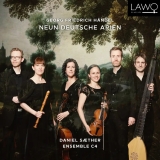Der Pressetext macht Lust und verspricht etwas Besonderes. Das sind sie auch – Händels Deutsche Arien auf Texte von Barthold Heinrich Brockes. Es ist ein Hochlied auf die Natur, die sinnbildlich für die Schöpfung, für den Glauben, für Gottvertrauen steht. Es gibt demnach viel Spielraum für feine Interpretationen, vorausgesetzt man ist der Sprache auch artikulatorisch mächtig.
Daniel Sæther bringt eigentlich die besten Grundlagen mit. Seine Stimme ist ebenmäßig, klar, geschmeidig und einnehmend. Die musikalische Rhetorik, das leicht Tänzerische passt auch. Nur beim Textverständnis hapert es mächtig: stark gedehntes E, verformtes U, verschluckte Vers-Enden rauben Händels und Brockes’ Poesie jegliche Aussagekraft.
Da hilft die feine, sensible und intime Geste des Instrumentalensembles leider auch nicht mehr viel. Am Ende reißt es dann noch Antonio Vivaldi heraus. Die spritzige, vitale und facettenreiche Interpretation der Triosonate La Follia mit einem gesunden Schuss mediterranem Leuchten offenbart das grundsätzliche Potenzial des Ensembles C4.
The press release whets the appetite and promises something special. And it is, at least as far as the work is concerned. Handel’s German Arias are based on texts by Barthold Heinrich Brockes. It is a hymn to nature, which symbolizes creation, faith and trust in God. So there is a lot of room for subtle interpretations, provided you have a good command of the language.
Daniel Sæther has the best prerequisites. His voice is even, clear, supple and engaging. The musical rhetoric, the slightly dance-like quality also fits. It’s only his pronounciation of the text that is lacking: strongly stretched E’s, deformed U’s, swallowed verse endings rob Handel’s and Brockes’ poetry of all expressiveness.
Unfortunately, the delicate, sensitive and intimate gestures of the instrumental ensemble don’t help much. In the end, Antonio Vivaldi pulls it off. The lively, vital and multifaceted interpretation of the trio sonata La Follia, with a healthy dash of Mediterranean glow, reveals the fundamental potential of the C4 ensemble.
























